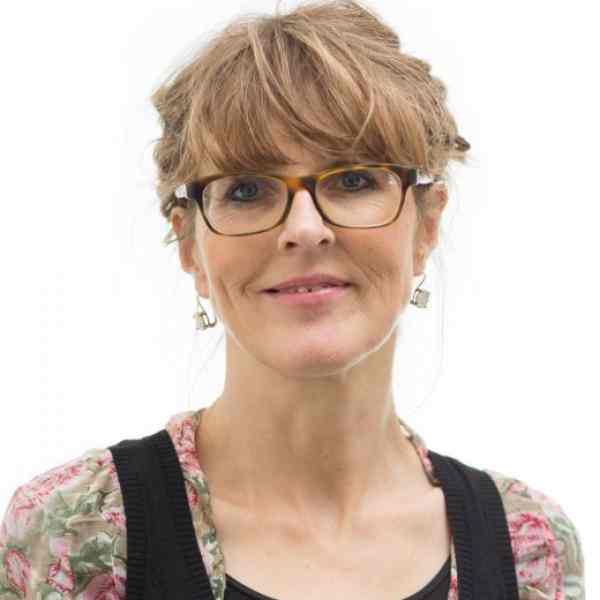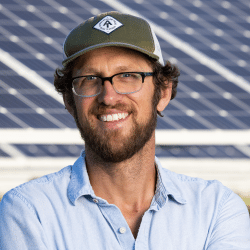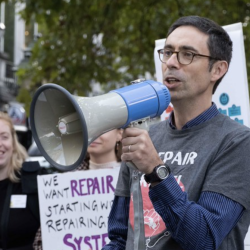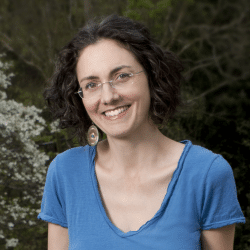Introduction
Alison Tickell, founder of Julie’s Bicycle, focuses on the ecosystem of culture as a central, vital driver in the fight against climate change. A multi-billion-dollar industry, culture is also a profound framechanger, influencing the minds, beliefs, and behaviors of millions of people – and its power as an industry is chronically underestimated. Alison works with the full ecosystem, from funding, procurement, infrastructure and logistics, to government ministries and funders, as well as the cultural practice itself: the artists and the stories they tell. Over the past thirteen years, Alison has found a truly unique approach to tackling climate change, by leveraging this major industry for international policy shift, creating tens of millions in energy savings, and utilizing the unique outreach of cultural producers to change mindsets and behavior, with a strategy fully prepared for the urgency of the moment.
L'idée nouvelle
Alison Tickell was consumed by the question: ‘how do you leverage a whole industry to fight climate change, and build a model that can be applied to industries across sectors?” She believes that we underestimate the power of culture in our lives -- music, theatre, TV and film, sports -- as repositories of cultural values and narratives that define our society. They also convene at all scales – small community moments, international visits to museums, euphoric festival experience, to global audiences online. Culture offers a vital arena for shared community and experience. And what bigger shared experience is there than climate change? Alison is using the levers of arts and culture--an industry that contributes £10.8 billion a year to the UK economy--by changing it from within.
Taking advantage of her experience in culture, Alison set up a series of steering groups comprising movers and shakers from the culture ecosystem to act as critical friends, diplomats and project sponsors to help set up the company, and then to guide its direction. Her business approach is inclusive, as a systems approach needs to be: international, national, and local government bodies, major companies, artists, donors and supply chains are championing a climate literate cultural community. Operating on the principle that 'an industry must embody the values it champions,' Alison’s organization Julie's Bicycle is influencing how cultural practice evolves within this powerful economic driver and in so doing, further influencing policy and consumer awareness. Julie’s Bicycle has a three-part offering which includes in-depth support for organizations seeking to transform their practices and a suite of tools, reporting methodologies, and certifications; a national and international policy arm; and a direct outreach approach with artists and leaders in the culture industry. Her online tools, consultancy, and Green Certifications fund her broader systems change work and advocacy to reform cultural policy. Each organization she works with offers a robust data set across her countries of operation, which informs her policy and strategy. She is keen to build capacity within the creative community to demonstrate change and amplify artist voices to catalyze change. JB’s by-line is: Change culture, and culture changes the world.
Her work is unique in how it uses arts and culture as the sophisticated, central tool towards enacting a climate shift. Alison works closely with the key players in the arts industry, including major concert/festival organizers Live Nation, music labels including Universal alongside the independent sector, globally famous touring bands, and major government funding bodies such as Arts Councils. This work is becoming increasingly international. Julie’s Bicycle has worked with 15 major cities to integrate culture in climate change planning and consulted closely with 2000 organizations. More than 5000 organizations have used the Creative Green Tools – carbon calculators designed with and for culture and now providing a powerful data set to feed into policy. As an early pioneer, JB also supports other initiatives in their formative stages, and jointly founded Music Declares Emergency, Powerful Thinking, and Green Arts Lab Alliance, and supports many others such as Happy Museum. Arts Councils in Ireland, Canada, and Australia, and the European Commission, have drawn on JB’s work, and opportunities for licensing in several other countries are ongoing. In the run-up to COP26 there is no time to lose, so understanding what cultural ‘collaboration at scale and speed’ looks like and championing the role of culture is an immediate priority.
Le problème
Solving the climate crisis needs us to collaborate at all levels. Climate impacts are generally associated with heavy industries, such as cement, aviation and, of course, energy. But transformation needs all of us, and the creative sector – worth £111.7 billion to the UK in 2018, equivalent to £306 million every day, and £166 billion in the USA – has impacts just as every other sector does, and of course, its influence is immeasurable.
When JB was founded it was clear that, in order to reduce greenhouse gas emissions, collective ambition needed a common starting whistle, a baseline and a sound roadmap. With no environmental impact data available for the arts (a problem which persists today in most countries) it was not possible to start this journey. Therefore, advocating the relevance of the climate crisis to culture, and building the tools and resources to take action was critical. We started by:
1. gathering data on greenhouse gas emissions with tolls co created with culture, collected at scale and over time;
2. championing case studies, solutions and stories of change;
3. building networks, knowledge-chains for the creative community, with events, training, projects and research programs;
4. producing culturally specific resources.
These foundations have evolved into a rich program that is now exploring creative climate leadership in order to scale the unmet potential of culture in all its manifestations, championing artists particularly through the lens of climate justice and focusing on cultural policy-making as a rapid agent of change. All the data, both quantitative and qualitative, is proving invaluable.
The climate crisis is a cultural crisis, in that it reflects our deepest values and identities. Environmental injustice is a growing problem and reflects cultural values that have, too often, championed human – and white - supremacy over all else; and therein lies the opportunity. Culture – artists, theatre makers, festival organizers, galleries and museums, poets and story-tellers – should be at the center of climate action, reframing the stories we tell ourselves and offering visions of a regenerative world in tune with the needs of nature and community. One of JB’s most enduring partnerships with a consortium of cultural organizations in Manchester has resulted in culture recognized as vital for the city’s ambitious climate targets. This is a rare recognition of culture’s potential.
La stratégie
Julie’s Bicycle has at its core a free resource base for anyone in the world to use. The first is a set of carbon calculators co-produced by the UK cultural sector which provide a snapshot of, for example, the carbon footprint of tours, productions, buildings etc. These are used throughout the program for benchmarking and planning. These tools have been used by 5000 organizations across 50 countries. The Creative Green program offers consultancy, environmental reporting, and the world’s first (though now not only) Green Certification for artistic organizations. The Green Tools are a starting point and Alison is developing a much broader, more holistic set of measurement tools, including science-based target tools, to provide to organizations. The Creative Green consultancy is an engine that helps to power the unfunded leadership work – advocacy and new ideas on the front lines of change, the ‘profit maker’ raising money through consultancy fees and royalties to fund policy shift and systems change.
These Creative Green tools provide a rich source of data and ‘intelligence’ on thousands of organizations and their procedures, progress, and approaches that inform all of Julie’s Bicycle’s policy work and future initiatives – a core part of their effectiveness. Any policy work is tracked, costed, and disseminated. Her research has been peer-reviewed by Oxford University.
Julie’s Bicycle has worked with many cities to make the links between culture and climate policy clear, and build culture into sustainability strategies. The Manchester Arts Sustainability Team (MAST) found in a study that working with arts and young people was the most effective way to change behavior towards climate change. Together with Julie’s Bicycle, their strategy is now being replicated in six other cities and has received an EU grant to replicate in six European countries.
She advocates for cultural policy change on a local, national, and international policy level to include culture in climate change plans. Julie’s Bicycle has a pioneering partnership with Arts Council England, which has required its core grant beneficiaries (currently around 800) to report annually on environmental impacts and have a policy. This requirement, in pace since 2012, has evolved and now includes the Accelerator Programme – 10 innovative projects led by organizations; and the Spotlight Programme, developing science-based targets with 30 of the 60 organizations that produce the majority of carbon emissions. Arts Council England’s policy has catalyzed an overall reduction of 41% of CO2 across the portfolio of 850 organizations, and a cost savings of around £16-20 million. Other national Arts Councils are looking at this model, and JB has presented, especially recently, to many. And beyond impacts alone, climate and the environment more generally are issues of huge concern and interest – indeed, over half of Arts Council England’s portfolio is now creating or commissioning work related to climate and climate justice.
Finally, she engages with artists and cultural leaders in centering climate work in their creative practice and entrepreneurship. An intensive Creative Climate Leadership program for artists and producers, and commissioning and events on climate justice, aims to build a global network of cultural changemakers. She is keen to build capacity within the creative community and lift up artistic voices as agents of change.
Alison’s work has catalyzed a powerful industry, and is using the talents and power of that industry – the influential voice of cultural producers and artists – to change the narrative on climate, as well as change national and international climate strategy. She is working with the biggest institutions in government and culture to change their own processes. She has partnered, or supported, sister initiatives in fashion, media and film industries.
To scale, she is planning to invest £700,000 to update the digital tools and resources and make them relevant for different country contexts.
Alison also has a keen focus on moving further internationally. She is in talks with potential partners in Ireland, Canada, Spain, Denmark, and Germany, and plans to license the tools to international cultural organizations, and launch an international Creative Green Kitemark. She wants to build an internationally tested model for a Green Deal that has policy influence at COP26 and beyond, publishing a public policy toolkit using her decade of data and findings. Her goal is also to activate a global network of cultural changemakers through her Creative Leadership programs, commissions, and other supports. Eventually, her vision is a series of regional hubs around the world, collaborating on change.
La personne
Alison’s background makes her current entrepreneurial trajectory seem inevitable. Raised in a family that included climate scientists, she was aware of climate change and the environment long before the climate crisis became globally understood. Her upbringing by left-leaning Catholic parents reinforced the importance of social justice as well as the arts. The middle child of seven brothers and sisters, she learned to be self-contained at an early age, and to diffuse conflict - the ‘quiet competition’ of so many kids necessitated a degree of survivalist tenacity and future entrepreneurialism. She was also steeped in the arts and creativity as a child. Her mother set up and ran her own children’s music project, providing an early example of entrepreneurial changemaking.
Although not currently practicing, Alison learned the cello from age 11 with an exhibitionship to the Royal Academy of Music, but quickly chafed at what she saw as the elitist constraints of the classical music world – an early disregard for traditional rules that would follow her through her life. A mentorship with renowned free jazz pioneer John Stevens deeply affected her approach to systems – ‘he took apart everything musicians thought they knew’ – an experience she says taught her how to understand her own creativity, and to teach these innovative methods to others. Alison left music but his approach to disruption, and the question of ‘How do you interpret justice through a creative lens?’ was one she has applied to her systems change work as a social entrepreneur throughout her life.
Alison has a strong track record in entrepreneurship, seeing the lack of opportunities for alternative ways of supporting fresh and current music and musicians rooted in community. Alison spent fifteen exciting years at Community Music, helping to establish pathways and support for many creative young people and projects. Realizing these young people did not have traditional educational qualifications, she – alongside another visionary, Dave O’Donnell – created new qualifications and training for talented young people with Goldsmith’s University. These were the first of their kind, and a precursor to her Green Certification efforts, and to Creative and Cultural Skills and the National Skills Academy – initiatives that sought to better match the needs of the creative sector with the interests of young people. Outside of Julie’s Bicycle, Alison has cofounded Music Declares Emergency and Powerful Thinking, and actively supports many others.




